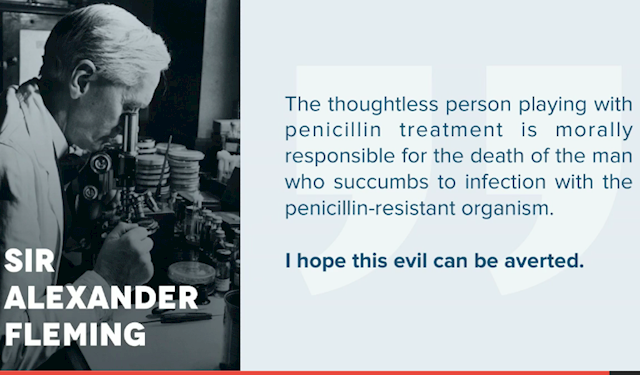
"Around the world people, animals and plants are already dying of infections that cannot be treated - even with our strongest antimicrobial treatments. If AMR is left unchecked, the next pandemic we face could be bacterial and much deadlier if the drugs needed to treat it do not work"
Nov 2020, Maria Helena Semedo, Deputy Director General, FAO
Since the discovery of penicillin in 1928, antibiotics have revolutionised modern medicine and saved millions of lives.
But the overuse of antibiotics in human and animal medicine is undermining their ability to cure life-threatening infections in people, by greatly increasing the spread of bacteria that are resistant to antibiotics.
Scientists have estimated that worldwide, in 2021, 1.14 million deaths were attributable to antibiotic resistance, and a total of 4.71 million deaths were associated with antibiotic resistance. They forecast that by 2050, annual deaths attributable to antbiotic resistance will increase to 1.91 million and associated deaths will increase to 8.22 million.
Despite this, huge amounts of antibiotics continue to be used in farming. Farm animals account for 62% of all antibiotics used in 29 European countries, and around 30% of all antibiotics used in the UK.
Across the world antibiotics are often given to healthy animals (particularly pigs and poultry) to compensate for low-welfare, cramped conditions where disease outbreaks are common and harder to control.
Livestock may even be given antibiotics classed as ‘critically important’ for people. The emergence of resistance to colistin - a ‘last-resort’ antibiotic for people - has shone the spotlight on how deeply dangerous our antibiotic addiction is. Human resistance to colistin has emerged from the overuse of the drug in farming, and represents a breach of our last line of defence against disease.
The overuse of antibiotics in farming must stop. We are in danger of losing these remarkable assets, and with them the ability to protect our health. This is no longer a prediction for the future. If we are to save our antibiotics, we must act fast.
It is time for urgent action on a scale appropriate to the magnitude of this crisis. In January 2022, the EU banned routine antibiotic use and preventative antibiotic group treatments. In July 2024, the UK also banned routine farm antibiotic use, but allowed preventative group treatments to continue.
We must also tackle the systemic problems at the heart of unhealthy farming systems. Animals should be kept disease-free through good hygiene, housing and welfare, not through routine antibiotic use.